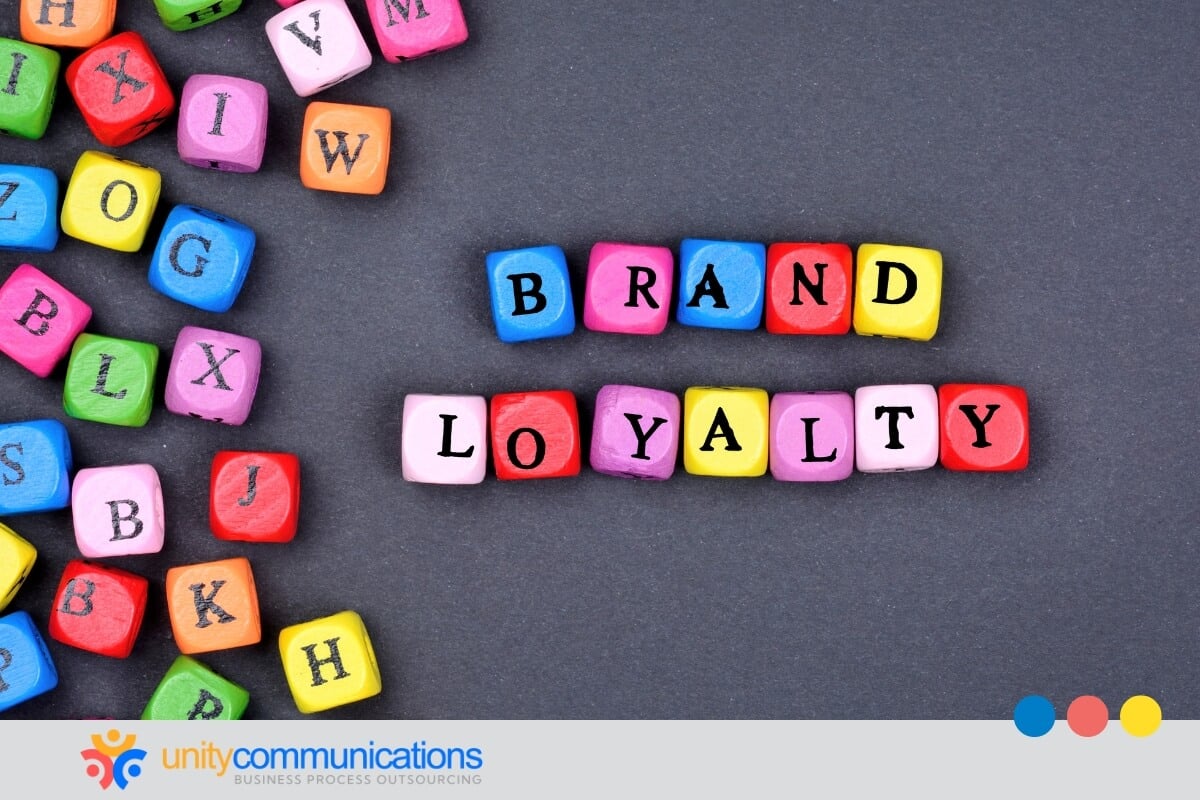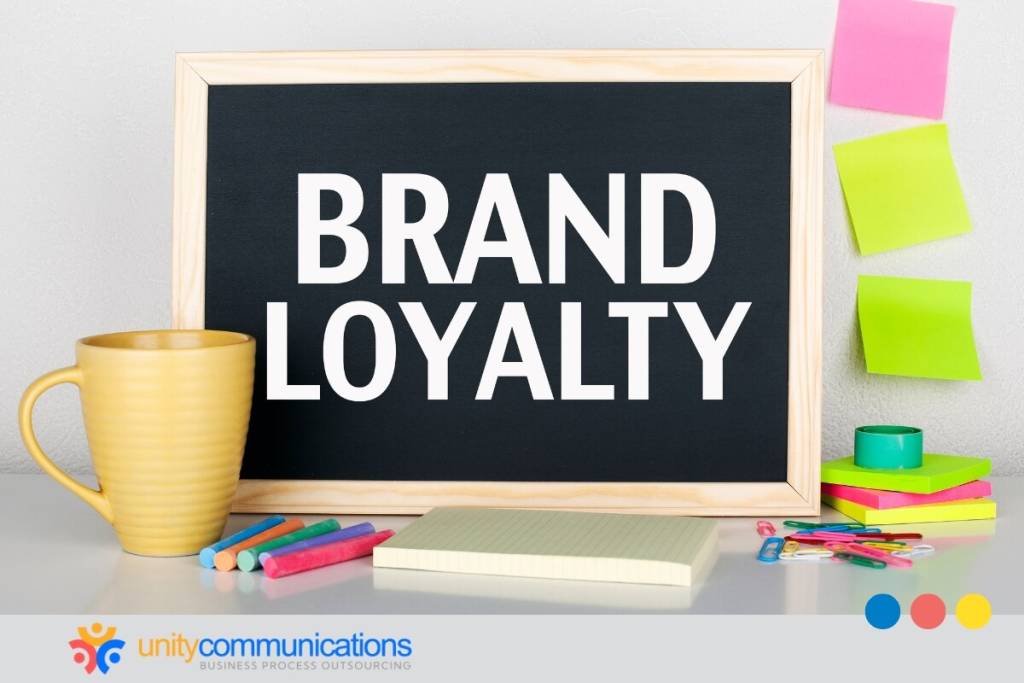IN THIS ARTICLE
Table of Contents
Nurturing customer relationships fosters brand loyalty. To successfully engage consumers in the digital age, businesses must ensure seamless interactions and personalized experiences.
Hence, brands are turning to business process outsourcing (BPO) to improve customer engagement. From enhancing support channels to tailoring solutions, BPO services have emerged as a pivotal strategy in cultivating brand loyalty.
This article delves into BPO’s role in reshaping the customer experience landscape and fostering brand loyalty. Continue reading to learn actionable insights.
BPO’s critical role in enhancing engagement and driving brand loyalty

Customer engagement and brand loyalty are crucial components of a successful business as they encourage repeat purchases. Loyal customers are more likely to choose their preferred products or services over competitors, leading to increased sales and revenue stability.
Satisfied and engaged customers are also more likely to recommend their favored brand to others. Positive word-of-mouth referrals can significantly enhance brand reputation and attract new customers, often at a lower cost than traditional marketing efforts.
Moreover, acquiring new customers is five times more expensive than retaining existing ones. Fostering engagement and loyalty can reduce marketing expenses associated with customer acquisition and focus resources on nurturing existing relationships.
What is BPO’s role in enhancing customer engagement and brand loyalty? Service providers manage essential functions and implement robust strategies for positive customer experiences.
Below are some examples of these crucial functions:
Gathering insights from customers
Success in business is determined not just by product or service quality but also by customer relationships. Brands with a deep understanding of customer needs and preferences can provide relevant solutions and create tailored experiences, improving relationships and fostering loyalty.
Developing detailed customer personas gives companies a blueprint of their ideal buyers. These profiles go beyond surface-level data, providing a comprehensive understanding of customer wants, needs, and behaviors. Additionally, ongoing customer feedback provides real-time insights into the market.
Here’s how BPO vendors gather customer insights to inform engagement strategies:
- Conducting market research and surveys. Market research and surveys are effective in gathering direct feedback. Whether assessing interest in a new product or identifying barriers to purchase, these tools provide valuable data that helps businesses stay attuned to evolving customer needs.
- Analyzing customer data and trends. BPO firms analyze purchase histories, interactions, and support ticket patterns to uncover trends. Are customers abandoning their carts? What product features do they value most? Data analytics addresses such questions, guiding future initiatives.
- Utilizing social listening and sentiment analysis. Much of the conversation about a brand occurs online, particularly on social media. Social listening tools scan these platforms for mentions of a brand, product, or competitor. It can also determine whether these mentions are positive.
Supporting the development of customer engagement strategies
Developing effective engagement strategies requires blending personalized interactions, omnichannel experiences, and interactive content to cultivate deeper relationships and create memorable brand interactions. On average, consumers increase spending by 46% when engagement is personalized.
One critical tactic BPO firms can help with involves customizing messages for specific buyer segments. For instance, offering a free trial to entry-level customers while promoting enterprise plans to larger clients creates targeted marketing communications, reducing message fatigue and boosting response rates.
Additionally, modern marketing automation and personalization tools in BPO can dynamically adjust content based on user behavior. For example, a customer regularly exploring enterprise content might encounter a homepage showcasing enterprise features in real time.
In today’s multi-device, multi-platform landscape, leveraging various marketing channels is essential. Businesses must engage customers wherever they are, whether on social media, email, or a website. However, being present across platforms isn’t sufficient; consistency is key.
Imagine encountering an appealing deal on a brand’s social media page, only to find it absent from their website. Such inconsistencies erode trust. With omnichannel support, BPO firms help maintain uniform branding and messaging for a seamless and trustworthy customer experience across all touchpoints.
BPO’s role in customer engagement and brand loyalty also involves data integration and customer journey mapping.
By aggregating data from every interaction—such as ad clicks and product browsing—businesses gain insights into a customer’s journey. They highlight potential engagement opportunities or drop-off points and enable tailored and impactful strategies.
Providing proactive and efficient support
BPO streamlines the process of handling customer questions and complaints, ensuring timely and effective resolution. Quick response times and resolutions contribute to positive customer experiences, leading to increased satisfaction and loyalty.
Service providers employ proactive engagement strategies to stay connected with customers even when they’re not actively seeking support. Outreach campaigns, loyalty programs, surveys, and follow-up communications demonstrate a commitment to customer satisfaction and build long-term relationships.
Moreover, BPO firms help monitor and manage brand presence on social media platforms, engaging with customers, addressing concerns, and fostering positive interactions. Active participation in social media conversations helps humanize the brand, build trust, and strengthen loyalty among followers.
Finally, BPO vendors can provide round-the-clock customer support through phone, email, live chat, and social media. This accessibility ensures that customers can reach out for assistance or information whenever they need it, increasing satisfaction and loyalty.
Measuring and optimizing engagement
Measurement and optimization are critical in customer engagement. The role of BPO in customer engagement and brand loyalty extends to assessing engagement metrics. For example, the click-through rate (CTR) indicates that the content has captivated attention and elicited action.
Beyond mere clicks, CTR is about retention or how long visitors stay on your site. If users linger, the content is likely engaging and helpful. Conversely, a swift departure might suggest a discrepancy between expectation and delivery.
BPO providers can also assist with analyzing customer behavior and interaction trends. For example, launching a new product leads to a surge in website traffic or heightened engagement from a specific demographic. These behaviors can be invaluable, offering insights into forthcoming trends or emerging market segments.
But what about the emotional aspect? How can brands discern if customers are genuinely content and not just engaged?
This is where BPO firms utilize satisfaction and loyalty metrics. Regular feedback sessions, net promoter scores, or even simplistic rating systems can measure customers’ sentiments. Elevated satisfaction frequently translates to brand allegiance, while downturns pinpoint areas necessitating attention and care.
BPO innovations for customer engagement

BPO contact centers have seen significant innovation in recent years, particularly in customer engagement. The following BPO innovations strengthen the industry’s role in increasing customer satisfaction and brand loyalty:
- Omnichannel support. BPO firms seamlessly offer support services across multiple channels. Customers can start a conversation on one platform and continue it on another without repeating information. Integrating social media, live chat, email, and phone ensures a cohesive customer experience.
- Artificial intelligence (AI) and automation. AI has revolutionized BPO, particularly in customer service. AI-powered chatbots can handle routine customer inquiries, freeing up human agents for more complex tasks. AI-driven analytics also help in predicting customer behavior.
- Predictive analytics. BPO firms leverage predictive analytics to anticipate customer needs and preferences. By analyzing past interactions, purchase history, and demographic data, they can offer proactive support and targeted marketing campaigns that enhance customer engagement and loyalty.
- Self-service portals. BPO providers use self-service portals so customers can find answers to common issues, track orders, and manage their accounts independently. This reduces the workload on customer support agents and empowers customers to find solutions at their convenience.
- Virtual assistants (VAs). AI-powered VAs are becoming increasingly high quality. These assistants can handle a wide range of tasks, including scheduling appointments, making reservations, and providing product recommendations, enhancing customer engagement around the clock.
The bottom line

In today’s market landscape, a transactional relationship with customers falls short. Businesses must cultivate deeper, more significant bonds that emphasize mutual value.
The essence of customer engagement lies within the strategies employed. Customized communication, a comprehensive omnichannel approach, and interactive experiences contribute to forging lasting brand connections.
Let’s connect to learn more about BPO’s role in customer engagement and brand loyalty.





